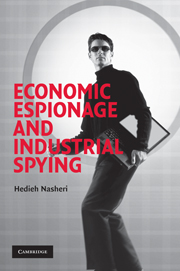Book contents
- Frontmatter
- Contents
- Preface
- Acronyms and Abbreviations
- 1 Dimensions of Economic Espionage and the Criminalization of Trade Secret Theft
- 2 Transition to an Information Society – Increasing Interconnections and Interdependence
- 3 International Dimensions of Business and Commerce
- 4 Competitiveness and Legal Collection Versus Espionage and Economic Crime
- 5 Tensions Between Security and Openness
- 6 The New Rule for Keeping Secrets – The Economic Espionage Act
- 7 Multinational Conspiracy or Natural Evolution of Market Economy
- Appendix A
- Appendix B
- Appendix C
- Notes
- References
- Index
4 - Competitiveness and Legal Collection Versus Espionage and Economic Crime
Published online by Cambridge University Press: 05 June 2012
- Frontmatter
- Contents
- Preface
- Acronyms and Abbreviations
- 1 Dimensions of Economic Espionage and the Criminalization of Trade Secret Theft
- 2 Transition to an Information Society – Increasing Interconnections and Interdependence
- 3 International Dimensions of Business and Commerce
- 4 Competitiveness and Legal Collection Versus Espionage and Economic Crime
- 5 Tensions Between Security and Openness
- 6 The New Rule for Keeping Secrets – The Economic Espionage Act
- 7 Multinational Conspiracy or Natural Evolution of Market Economy
- Appendix A
- Appendix B
- Appendix C
- Notes
- References
- Index
Summary
gathering and using information to advantage is the underlying theory of business intelligence systems. These systems attempt to bring to business the information gathering and analyzing methods of government intelligence agencies, much in the same way that military strategic planning tactics shifted into business practice after World War II. The difference is that the tool for gathering and analyzing information and distributing it to the proper decision makers is not a network of spies, but a LAN of personal computers. This approach combines pieces of data from multiple disparate sources and creates the key nuggets that comprise “intelligence.” The data can come from structured (e.g., databases) or unstructured (e-mail, web pages, broadcasts, and other dissemination media) sources, and can originate as text, video/image/icons, and even as auditory or other “signal” data streams.
What Is Competitive Intelligence?
Structural analysis of industries, commonly known as the Harvard Business School method, investigates industry competition through the study of rivalry among competitor firms, bargaining relationships between buyers and suppliers, substitutability of products and services, and potential new entrants to competition. The sources of competitive advantage are analyzed by investigating the nature of rivalry within the industry, including the number of firms and their market shares, the pace of growth in the industry, the extent of product or service differentiation, and the barriers to entry and exit.
- Type
- Chapter
- Information
- Economic Espionage and Industrial Spying , pp. 72 - 94Publisher: Cambridge University PressPrint publication year: 2004



